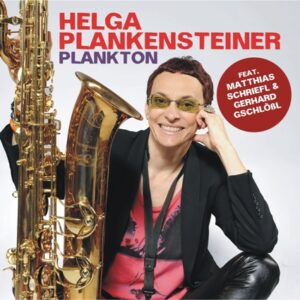CD jw 141 HELGA PLANKENSTEINER
PLANKTON
HELGA PLANKENSTEINER baritone saxophone & voice
MATTHIAS SCHRIEFL trumpet
GERHARD GSCHLÖßL trombone
ENRICO TERRAGNOLI guitar & banjo
MICHAEL LÖSCH Hammond organ & piano
NELIDE BANDELLO drums
DE
Wie Plankton den Meeresströmungen folgt, lässt sich die Musik von Helga Plankensteiner’s neuem internationalem Projekt mit großer Leichtigkeit und frei von Berührungsängsten von einer Stilrichtung zur anderen treiben.
Die meist aus der Feder der Saxophonistin stammenden instrumentalen Kompositionen lassen sich schwer einordnen, bringen immer wieder unerwartete Stimmungen in den Vordergrund und sind geprägt vom schönen Klang des Baritonsaxophons. Die zwei gesungenen Lieder sind wie so oft in Helga Plankensteiner’s CD’s Stilbruch und Überraschung zugleich.
„Loo“ ist eine Hommage an den Trompeter Lew Soloff, dessen Humor und großartigen Sound, zwischen Tradition und Moderne, Helga „on tour“ mit der Carla Bley Bigband kennengelernt hat.
„The Never Ending Blues“ ist eine Dehnungsübung zum Thema 12 Takte, verläuft gezielt durch zahlreiche Tonarten und verschmäht nicht Anleihen von Ellington und Mingus.
„Quentin“ könnte ein imaginärer Soundtrack einer Filmszene frei nach Tarantino sein und „Meister Schriefl“ ist ein ernst gemeintes, aber humoriges Portrait des Allgäuer Trompeters Matthias Schriefl.
Das zweiteilige Stück „No Ballad No Crime“ führt von einer schmalzig-schönen Melodie zu afrikanisch-energetischem Überschwang, „Tangomatango“ klingt wie eine verwischte Postkarte aus Südamerika, die irgendwie nach Skandinavien gelangt.
Die beiden Songs, Gershwins „They can’t take that away from me“ (vielleicht auch Motto des Sextetts) und „Comes Love“ werden um Jahre zurück in Südstaatenklima versetzt und brechen die den Sound der anderen Kompositionen auch durch die Verwendung von Banjo und Klavier.
Den Abschluss bildet der Gospel „Tears“, ein ironisch-melancholischer Ausklang einer abwechslungsreichen Reise durch Zeit und Raum. Michael Lösch
EN
Like plankton flowing with the ocean currents, the music from Helga Plankensteiner’s new international project drifts easily and without reserve from one musical style to the next.
The instrumental compositions, most of them written by the saxophonist, are hard to label. They repeatedly shift unexpected moods into the foreground, dominated by the lovely sound of the baritone sax. The two vocal pieces are, as is so often the case with Plankensteiner’s cds, at once a style change and a surprise.
„Loo“ is an homage to the trumpeter Lew Soloff, whose humor and fantastic sound, between tradition and modern, were introduced to Helga when she was on tour with the Carla Bley Big Band.
„The Never Ending Blues“ is an exercise on the subject of 12 bars, running resolutely through several keys and not averse to borrowing from Ellington and Mingus.
„Quentin“ could be an imaginary soundtrack from a movie scene in Tarantino style and „Meister Schriefl“ is a seriously-intended yet humorous portrait by the Allgäu trumpeter Matthias Schriefl.
The two-part piece “No Ballad No Crime” leads from a schmaltzy melody to energetic African exuberance; “Tangomatango“ sounds like a smudged postcard from South America that somehow ended up in Scandinavia.
The two songs — Gershwin’s „They can’t take that away from me“ (perhaps the sextet’s motto as well) and „Comes Love“ go back in years to the climate of the south and are distinguished from the other pieces through the inclusion of banjo and piano.
It ends with the gospel song „Tears,“ an ironic, melancholy finish to an interesting journey through time and space. Michael Lösch
IT
Come il plancton si lascia portare dalle onde del mare, la musica del nuovo
progetto internazionale di Helga Plankensteiner fluttua con grande scioltezza tra
diversi stili. Le composizioni strumentali, in gran parte firmate dalla sassofonista, sono difficili da classificare. Brani che spesso sorprendono con atmosfere inaspettate, caratterizzati dal suono poderoso del sassofono baritono. I due standard cantati, come spesso accade nei dischi di Helga Plankensteiner, si distinguono ulteriormente dal resto del repertorio.
„Loo“ è un omaggio al senso dell’umorismo e magnifico sound del trombettista Lew Soloff che Helga ha potuto conoscere suonando insieme nella Bigband di Carla Bley.
„The Never Ending Blues“ é un esercizio di stretching sul tema delle 12 misure
che modula impietosamente in numerose tonalità ammiccando in qualche
occasione alla musica di Ellington e Mingus. „Quentin“ potrebbe essere una
colonna sonora di un immaginario film di Tarantino e „Meister Schriefl“ un ritratto serio (ma non troppo) del trombettista bavarese Matthias Schriefl. Il brano in due parti „No Ballad No Crime“ inizia con una bella melodia sensuale per arrivare ad un esplosione di energia ritmica dal sapore africano. „Tangomatango“ sembra una cartolina sbiadita spedita dal Sudamerica e arrivata in qualche maniera in Scandinavia. Le due song, la gershwiniana „They Can’t Take That Away From Me“ (che potrebbe essere il motto del sestetto) e „Comes Love“, vengono trasferite indietro nel tempo in un atmosfera da lontani paesi del sud cambiando completamente la sonorità del gruppo con l’uso di banjo e pianoforte. „Tears“, una specie di ironico e melanconico gospel diventa l’epilogo di un immaginario viaggio nel tempo e nello spazio. Michael Lösch

